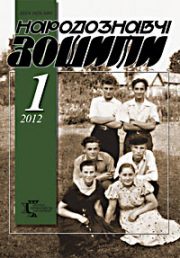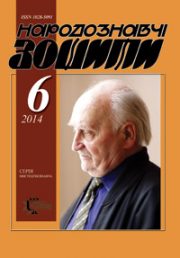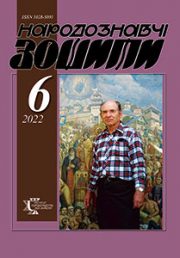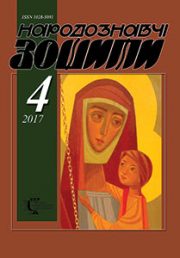The Ethnology Notebooks. 2022. № 3 (165), 562—572
UDK [[069.02:728.82]:749.1.035.5](477.83-21)
DOI https://doi.org/10.15407/nz2022.03.562
KASHCHII Mariia
- ORCID ID: https://orcid.org/0000-0003-2962-4266
- Senior Research Fellow
- of the Grand Palace of Zolochiv Castle Museum Sector of Zolochiv Castle,
- Museum-Reserve Department of the B. Voznytskyi LNGM
- 5, Ternopil street, 80700, Zolochiv, Ukraine,
- Contacts: e-mail: kashchiymaria@gmail.com
Abstract. Introduction. In the halls of the Grand Palace of the Museum-Reserve «Zolochiv Castle», a branch of Lviv National Gallery of Arts named after B. Voznytskyi among a large number of city monuments of the XIX century. (paintings, weapons, porcelain, sculptures, carpets) presents a large group of furniture (112 units). Among them, neo-Rococco furniture stands out as an original artistic solution.
Formulation of the problem. This group of furniture presents a certain difficulty in attribution, as most items are purchased from private individuals at different times, information about their previous owners and the history of origin is completely lost.
Methods. It is possible to shed more light on the origin, artistic and historical value of this group of furniture only with the help of artistic and stylistic analysis, search for analogues and comparative analysis.
Results. The article emphasizes that in the art of Galicia in the second half of the XIX century historicism is becoming the dominant theoretical concept and method of artistic creativity, and the choice of style, which focused on the masters of a particular group of furniture significantly influenced both their artistic and constructive solution and technical performance. It is established that the considered furniture is made in Austria in the last third of the XIX century in the style of neo-rococco, or «second rococco» (as this style was called in German-speaking countries) It is important to note that the structural and compositional solution of this furniture was mainly influenced by synchronous products in Neo-Renaissance style, and Rococco elements were only used in the decor and, based on tradition, boldly rounded shapes and curved structural lines.
Conclusions. An analysis of the furniture from the Zolochiv Castle Museum showed that it was within the neo-Rococco style in the period of historicism in the last quarter of the 19th century the masters acquired the skills to boldly transform forms in the direction of imitating the curvilinear curves of wildlife, which in the near future came in handy in mastering a new style-art nouveau.
Keywords: historicism furniture, eclecticism, wooden furniture, neo-rococco, sideboard.
Received 6.04.2022
REFERENCES
- Sobolev, N. (1939). Styles in Furniture. Moscow [in Russian].
- Kes, D. (1981). Styles of Furniture. Budapest [in Russian].
- Moran, A. (1982).The history of arts and crafts from ancient times to the present day. Moscow: Art. [in Russian].
- Sokolova, T. (2000).Essays on the history of artistic furniture of the 15th—19th centuries. Moscow: Svarog & K [in Russian].
- Gogol, N. (1952).About the architecture of the present time. In: Gogol, N. Complete set of works (Vol. 8, pp. 56—75). Moscow; Leningrad [in Russian].
- Haaff, R. (2012).Magnificent 19th Century Furniture: Historicism in Germany and Central Europe.Leopoldshafen [in Deutsch].
- Huntley, М. (2013).History of furniture: From antiquity to the 19th century. Warsaw: Arkady[in Polish].
- Miller, J. (2010).Furniture: all styles from ancient to modern. Moscow: AST-Astrel [in Russian].
- Pavluk, S. (Ed). (1996). Museum of Ethnography and Crafts of the Institute of Ethnology of the National Academy of Sciences of Ukraine: Guidebook. Lviv [in Ukrainian].
- Stankevych, M. (2002). Ukrainian wooden artefacts of the 16th—20th centuries. Lviv [in Ukrainian].
- Boidi, S.A., Cozzi, L., Griffo, М., & Ponte, A. (1997). The 19th century furniture. Warsaw [in Polish].
- Sofieva, N. (2012).Interior design: styles, trends, materials. Moscow: Eksmo[in Russian].
- Miller, J. (2001).Antiques Handbook. Moscow[in Russian].
- Grigorieva, M. (2004).Biedermeier furniture. Antiques, 9 (20), 9—17 [in Russian].
- Veszpremi, N. (2014). The emptiness behind the mask: the second rococo in painting of Austria and Hungary. Art Bulletin, 96 (4), 441—462.
- Goriunov, V., & Tubli, M. (1992).Modern architecture: Concepts, directions, masters. St. Petersburg: Stroyizdat [in Russian].
- Virtue, G. (1851). The Art Journal Illustrated Catalogue: the Industry of Nations. London.
- (1851). Official descriptive and illustrated Catalogue of the Great Exhibition of the Works of Industry of All Nations, 3. London.







